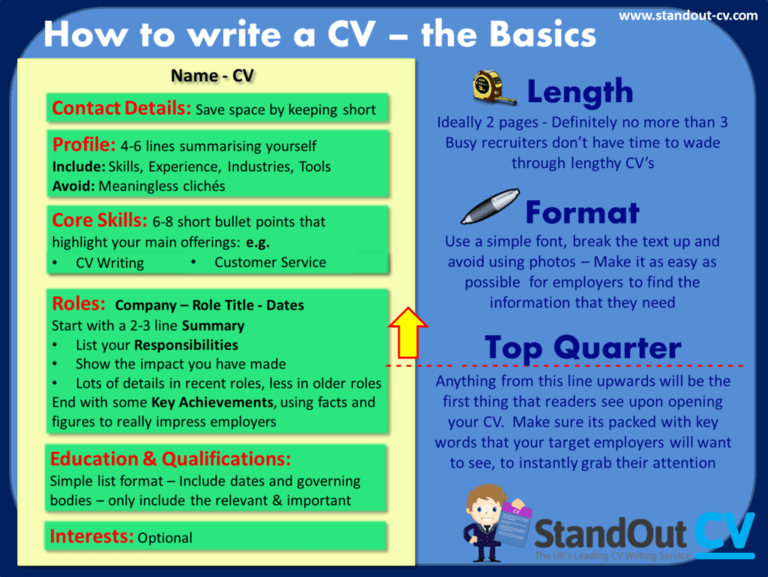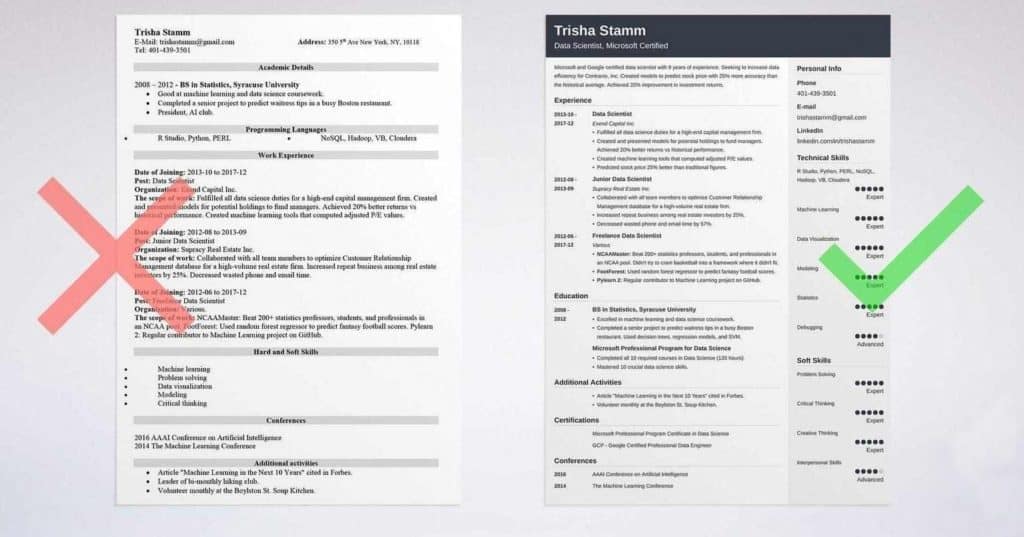A good CV Format for Job is must necessary these days. CV i.e. curriculum vitae plays a vital role in getting your most awaited job opportunity in your hand. Hence your CV should portray your professional and personal skills. By skills we mean your abilities and knowledge which are definitely going to prove your credibility to the company or the organization. For an appropriate demonstration of what you have achieved and what you are capable of doing on the basis of your past experience, your CV needs perfect formatting which makes your profile worth reading and understandable to the employer. As we say the first expression is the last expression and practically you are not present in front of the employer but your CV does. Your employer or Hiring manager should get that confidence by reading your CV that this particular profile is worth inviting for a face to face interaction.

Academic resumes differ from other styles of resumes in that they can be longer than two sides of A4 and include details of your research and other relevant experience. Typically, college resumes include a brief description of your experience, with a focus on content related to the field, such as a description of the research project and the methods you used. As a student, sections of your resume will depend on the experience you have had so far, and professors or researchers interested in hiring undergraduate students do not expect you to have experience at the undergraduate level. Depending on your industry and the position you’re applying for, you may also need to include the following optional sections on your resume. On your academic CV, you can choose whether to include other non-academic work experience depending on the opportunity to apply. For example, some medical or academic resumes may be longer depending on your experience.
For example, if your experience fits on one page, a resume might be the best choice. If you have limited experience, you can include your search in the work experience section and use the same format you used for your work history. Some candidates with unusual work experience may consider using a skills-based resume format. While skill-based or chronological resumes are suitable for many positions and situations, you may wish to use a combination of these formats or have different requirements in certain industries and jobs. Resumes vary based on your field and experience, but there are some general formatting and style guidelines to follow when creating a resume. There are also sections in most people’s resumes, as well as optional sections. Although the three-page resume is not used as often, it may be needed for those in leadership positions or people who have gained a lot of experience or have worked in several positions in the last five or ten years. You can find them by asking other graduate students and junior faculty members in your department if you can take a look at their resumes, and you can also use the Internet to find examples of resumes in your discipline. Vitae offers academic resume advice for researchers and includes sample resumes.

Similar to a resume, a curriculum vitae (CV) contains a summary of your experience and skills and includes your experience in education, work, research, and community service, memberships and leadership roles in organizations, awards, publications, and presentations. A curriculum vitae also called a CV or life, is, as the name suggests, an overview of your life’s accomplishments, especially those related to the academic field. In the United States, Curriculum Vitaes (CV) is used to apply for teaching or research opportunities, scholarships, further academic study, bursaries, contract funding offers, mandate, promotion to professorships, and membership in a company or professional organization. For many years, skill-based resume creation has been recommended as the best way to cover employment gaps or lack of relevant work experience. The good news is that by making a few simple changes to your resume format, you can make significant improvements that will greatly increase your chances of getting an interview. In this article, we’ll show you what to include on your resume, how to format it properly, and give you some examples of resumes and resume templates to build on.
To achieve the early appointment, we need to understand that your CV Format for the Job should complete these below-mentioned points:
- Personal Details: To start with, your personal details like your full name your contact number and your current address should be handy so that employers do not need to scroll much to find these details.
- Current Job Status and Responsibilities: Your employer is much more interested in what you are doing at present in the firm so that he can get well versed with your position in current firm abilities.
- Past work experience: Your past experience in years from firm to firm that should be in sequence and displays your professional growth. And also helps the employer to understand your credibility as well. For instance, If you have stayed in one firm for a long time and got good promotions on the basis of your performance and achievements shows your will powers and demonstrates your hard work as well.
- Any professional training and Certifications: CV formats consisting of professional training and certification gets more eye ball rolls though your academics are important too, but organizations also do rely upon your professional training.

- Core Competencies: A detailed explanation of your core competencies makes your good presentation in front of your employer. Rather than giving the bullet points of your skills, add a little detail extra to your CV format to make it worth reading and knowing your skills even better.
- Your Professional achievements so far: Your Professional achievements built more confidence in your hiring manager as it shows your sense of hard work and your dedication to the job.
- Lengthy CV doesn’t really work: Your CV format should be more comprehensive and should contain essentials details. Making it unnecessarily large doesn’t make any sense and actually it’s not going to help. No employer or the hiring manager has that much time to read unimportant content of you CV.
- Personal Details: Personal Details are important too like your hobbies and your marital status your date of Birth Company do count on that as well before considering you to their firm.
- Ref Checks: If you have any good references you can add them to your CV Format it helps the hiring manager to make the ref checks and better understanding your personal and professional skills.
Your CV Format should be the way to advertise or speak on your behalf considering above mentioned points really makes a huge difference. Click here to Download CV Forms.
